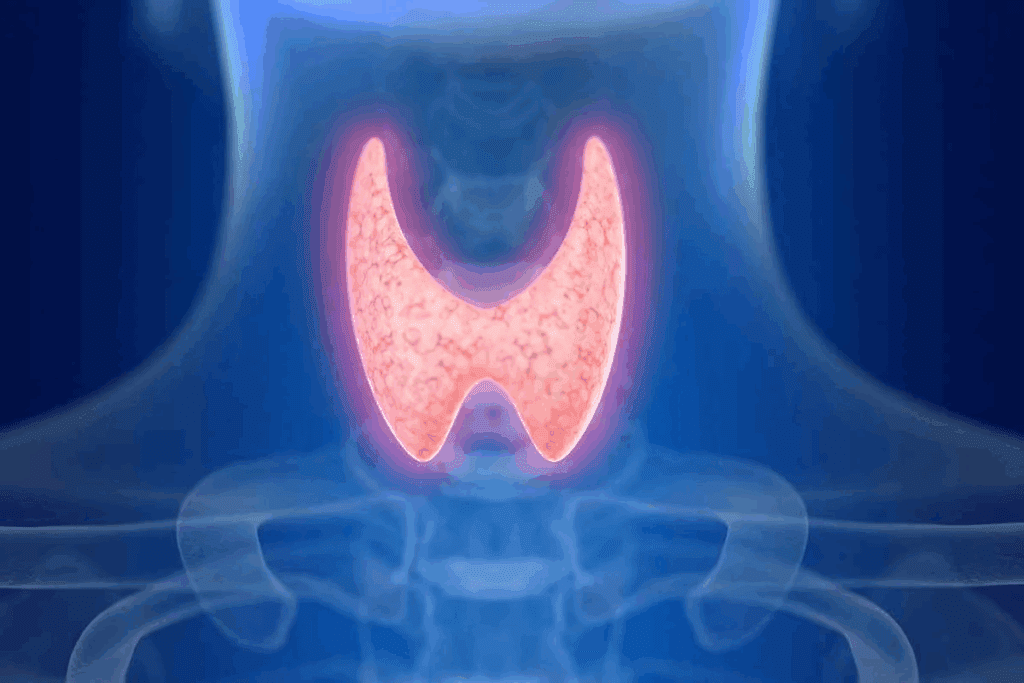Last Updated on November 26, 2025 by Bilal Hasdemir

Hyperthyroidism is when your thyroid gland works too hard. It affects both your body and mind. StudiesDiscover anxiety or thyroid symptoms, how to tell the difference, and when to get tested.
Too much hormone from the thyroid gland causes symptoms like a fast heart rate and weight loss. It also makes you feel more anxious. Knowing how hyperthyroidism and anxiety are connected is key to finding the right treatment.

Thyroid hormones are key to many body functions, including mental health. The thyroid gland makes hormones that affect almost every cell. This impacts metabolism, energy, and balance.
The link between thyroid function and mental health is complex. Thyroid hormones help make neurotransmitters, which are vital for mental health. But, thyroid problems can cause anxiety and depression.
Thyroid hormones greatly affect neurotransmitters like serotonin and dopamine. These are important for mood. An imbalance can lead to anxiety and other mental health issues.
Key neurotransmitters affected by thyroid hormones include:
Anxiety is common in thyroid disorders, like hyperthyroidism. Many with thyroid issues experience anxiety. Treatment can help manage these symptoms.
| Thyroid Condition | Prevalence of Anxiety |
| Hyperthyroidism | High |
| Hypothyroidism | Moderate |
| Autoimmune Thyroiditis | Variable |
For those with anxiety, a detailed endocrine evaluation is vital. It checks thyroid hormone levels and for disorders. This helps find and treat thyroid issues that may cause anxiety.
By treating thyroid disorders, doctors can help reduce anxiety. This shows the need for a full diagnostic approach.

Hyperthyroidism affects more than just the body. It can deeply impact mental health and overall well-being. People with this condition often feel intense anxiety, get easily irritated, and experience mood swings, often worse at night.
Several factors can lead to hyperthyroidism. These include Graves’ disease, thyroid nodules, and thyroiditis. Graves’ disease is an autoimmune disorder that makes the thyroid gland produce too many hormones.
Too many thyroid hormones speed up the body’s metabolism. This can cause weight loss, fast heart rate, and shaking. It also affects mental health, causing anxiety, mood swings, and irritability.
| Physical Symptoms | Mental Health Implications |
| Weight loss, palpitations, tremors | Anxiety, mood swings, irritability |
| Increased heart rate, heat intolerance | Emotional instability, restlessness |
| Fatigue, muscle weakness | Difficulty concentrating, mental fog |
Finding hyperthyroidism early is key to managing it well. If left untreated, it can cause serious problems like heart issues and weak bones.
Early detection means quicker treatment, lowering the risk of serious health problems. It involves checking symptoms, lab tests, and sometimes imaging to find the cause.
It’s hard for doctors to tell if someone has anxiety or a thyroid problem. The symptoms can look the same, making it key to find the real cause.
Studies show that 5% of new anxiety cases might be linked to thyroid issues. This shows why checking the thyroid is important when someone has anxiety symptoms.
Thyroid disorders can cause symptoms like feeling nervous, restless, and having a fast heart rate. These signs might mean there’s a thyroid problem, not just anxiety.
Anxiety and thyroid problems share some symptoms, but there are differences. For example, thyroid issues often cause weight loss, tremors, and heat intolerance. These aren’t common in just anxiety.
It’s important to know when to test for thyroid issues. Doctors should test for thyroid problems in patients with anxiety, if they’ve had thyroid issues before, or show signs of thyroid problems.
Spotting thyroid-related anxiety early can really help patients. By telling anxiety apart from thyroid problems, doctors can give better treatment plans.
People with hyperthyroidism often feel very nervous and restless. This shows how thyroid health affects our minds. These feelings can really mess up our daily lives and make us unhappy.
Thyroid hormones control important brain chemicals like serotonin and dopamine. These help us stay mentally healthy. But, too much of these hormones can upset this balance.
This imbalance can make us feel very anxious. We might feel nervous and restless all the time.
The reasons behind thyroid-induced anxiety are complex. For example, too much thyroid hormone makes our brain more sensitive to stress hormones. This can make us feel like we’re always ready to fight or run away. This feeling can show up as constant nervousness and restlessness.
Thyroid-induced anxiety and primary anxiety disorders look similar but have different causes. Primary anxiety disorders come from things like stress, trauma, or our genes. But thyroid-induced anxiety is caused by too much thyroid hormone in the brain.
Knowing the difference is important for treating anxiety. For people with hyperthyroidism, fixing the thyroid problem is key. This can help reduce anxiety symptoms.
Hyperthyroidism anxiety can cause a racing heart and palpitations. These symptoms affect daily life. They happen because too much thyroid hormone affects the heart.
Too much thyroid hormone can harm the heart. It makes the heart beat faster and work harder. This can lead to palpitations, a racing heart, and arrhythmias.
| Cardiovascular Symptom | Description | Relation to Hyperthyroidism |
| Racing Heart | An abnormally fast heart rate | Caused by excess thyroid hormones increasing heart rate |
| Palpitations | Sensation of irregular or forceful heartbeats | Result of increased cardiac output and sensitivity to catecholamines |
| Arrhythmias | Irregular heart rhythms | Can be triggered by the heightened cardiac excitability due to excess thyroid hormones |
Racing heart and palpitations can feel like a panic attack. But, there are big differences. Panic attacks are filled with fear, while hyperthyroidism symptoms come from too much thyroid hormone.
Key differences include:
Knowing these differences is key for the right diagnosis and treatment. If you’re experiencing these symptoms, see a doctor for a full check-up.
Many people with hyperthyroidism struggle with sleep problems. These issues can make nighttime anxiety worse. The link between hyperthyroidism and sleep is complex, involving both physical and mental factors.
Studies show that hyperthyroidism can mess up sleep patterns. A study in the Journal of Clinical Endocrinology and Metabolism found that it leads to less efficient sleep and more breaks in sleep.
“Hyperthyroidism is associated with reduced sleep efficiency and increased sleep fragmentation”
This can cause more anxiety and irritability, mainly in the evening.
Several factors make hyperthyroidism anxiety worse at night. One reason is the body’s natural rhythm, which controls hormone release and body temperature. Too much thyroid hormone can upset this rhythm, making you feel more alert and anxious at night.
Another reason is the emotional impact of hyperthyroidism symptoms. People with this condition often feel more stressed, which gets worse at night when there’s less to distract them.
Poor sleep quality is a big problem for those with hyperthyroidism. It can make anxiety and depression symptoms worse, creating a cycle that’s hard to break. A study in the Journal of Affective Disorders showed that sleep issues in hyperthyroid patients are linked to more anxiety and depression.
“Sleep disturbances in hyperthyroid patients were associated with higher levels of anxiety and depression”
| Symptom | Effect on Sleep Quality | Impact on Mental Health |
| Excess Thyroid Hormones | Increased alertness, difficulty falling asleep | Heightened anxiety, irritability |
| Nighttime Anxiety | Reduced sleep efficiency, increased sleep fragmentation | Increased symptoms of depression, anxiety disorders |
| Sleep Disturbances | Poor sleep quality, daytime fatigue | Worsening of anxiety and depressive symptoms |
Managing sleep disturbances in hyperthyroidism requires a complete approach. This includes medical treatment, changes in lifestyle, and support for mental health. By tackling the root causes of sleep and anxiety problems, people with hyperthyroidism can get better sleep and improve their mental health.
In conclusion, sleep issues and nighttime anxiety are big concerns for those with hyperthyroidism. It’s important to understand how hyperthyroidism, sleep, and mental health are connected. This knowledge helps in finding effective ways to manage these problems.
Hyperthyroidism can make it hard to focus. Thyroid hormones are key to our brain’s function. An overactive thyroid can upset this balance.
When thyroid hormones are off, it messes with our brain’s work. This can cause mental fog, forgetfulness, and trouble focusing.
Thyroid hormones are vital for our brain’s health. They help make neurotransmitters like serotonin and dopamine. These are important for mood, attention, and thinking.
Research shows thyroid problems can hurt our brain. Even mild issues can affect how we think and remember.
“Thyroid hormones are key for brain function and growth. An imbalance can cause symptoms like trouble focusing and feeling foggy.”
Here’s a table showing how thyroid issues affect our brain:
| Cognitive Function | Normal Thyroid Function | Hyperthyroidism |
| Attention and Concentration | Normal focus and attention | Difficulty concentrating, easily distracted |
| Memory | Normal memory recall | Forgetfulness, memory lapses |
| Processing Speed | Normal processing speed | Slowed or accelerated processing |
Dealing with cognitive symptoms from hyperthyroidism needs a few steps. Treating the thyroid issue is key to help symptoms.
Other ways to manage symptoms include:
Understanding thyroid issues and their effect on our brain is important. By managing symptoms, people with hyperthyroidism can live better lives.
Hyperthyroidism can cause many emotional and psychological symptoms. These symptoms can greatly affect a person’s life quality. Thyroid hormones are key to our emotional and mental health. An overactive thyroid can upset this balance.
Irritability is a common sign of hyperthyroidism. People might get easily upset or annoyed. This emotional instability can harm personal and work relationships.
The reason for this irritability is the extra thyroid hormones. They mess with neurotransmitters like serotonin and dopamine. These are important for keeping our mood stable.
Hyperthyroidism can also cause panic attacks and a stronger fear response. The extra thyroid hormones make the body’s “fight or flight” response stronger. This can lead to symptoms that feel like panic attacks.
These episodes can be very intense and happen without warning. This can make anxiety worse.
Mood swings are another sign of hyperthyroidism. People might quickly switch from calm to being upset or sad. This emotional volatility is hard to handle and may need changes in treatment and coping strategies.
Excessive worry is a big part of anxiety disorders. In hyperthyroidism, this worry is hard to manage with usual methods. This worry can be very distressing and might need a special approach to manage, focusing on treating the thyroid condition.
| Emotional Manifestation | Description | Impact on Daily Life |
| Irritability | Easily agitated or annoyed | Strains personal and professional relationships |
| Panic Attacks | Heightened fear response, intense episodes | Increases anxiety levels, can be debilitating |
| Mood Swings | Rapid shifts in mood | Challenging to manage, affects emotional well-being |
| Excessive Worry | Resistant to typical anxiety management | Distressing, requires nuanced management approach |
Hyperthyroidism’s physical signs play a big role in making anxiety worse. While we often talk about emotional and psychological signs, the physical symptoms are just as important. These symptoms can really affect a person’s mental health, mixing up how the body and mind work together.
Tremors and shakiness are common signs of hyperthyroidism. These movements can be scary and embarrassing, making anxiety worse. The imbalance of thyroid hormones affects the nervous system, causing these symptoms.
Tremors can be really tough because they’re visible to others. This can lead to more social anxiety and feelings of restlessness. Treating tremors often means fixing the thyroid problem.
Excessive sweating and heat intolerance can really affect comfort and anxiety. An overactive thyroid gland messes with temperature regulation, causing too much sweat even in cool places.
Heat intolerance makes it hard to handle normal temperatures. This can make people feel uncomfortable and anxious, worse in warm weather or hot places.
Fatigue and restlessness are a strange mix. People with hyperthyroidism often feel tired but can’t relax. This mix is really tough, as the tiredness is overwhelming while the restlessness keeps them on edge.
This mix can really increase anxiety. The body and mind are always on high alert, even when tired. Fixing this symptom needs a plan that looks at both physical and mental health.
Managing hyperthyroidism is key to reducing thyroid-related anxiety. Studies show that anxiety symptoms often lessen when thyroid levels are controlled.
Doctors usually treat hyperthyroidism with medication, radioactive iodine, or surgery. These methods aim to balance thyroid hormone levels. This helps reduce symptoms like anxiety.
Once thyroid hormone levels are back to normal, anxiety symptoms can improve. It’s important for those with hyperthyroidism and anxiety to see a doctor. They can get the right diagnosis and treatment.
Knowing how hyperthyroidism and anxiety are linked helps people get the right care. This care can improve mental health and overall well-being. Treating both thyroid issues and anxiety together can lead to better recovery.
Yes, it can. Too much thyroid hormone can mess with brain chemicals. This leads to feeling nervous, restless, and anxious.
Hyperthyroidism anxiety is similar to other anxiety disorders. But it’s caused by too much thyroid hormone. Treating the thyroid condition is key to easing anxiety.
Symptoms include feeling always on edge and restless. You might have a racing heart, trouble sleeping, and find it hard to focus. Irritability, panic attacks, and mood swings are also common.
Thyroid hormones help control brain chemicals like serotonin and dopamine. Too much can upset this balance. This can cause anxiety.
Yes, it can. Anxiety is a sign of thyroid problems, including hyperthyroidism. It’s important to check thyroid function in anxious patients.
Catching hyperthyroidism early is vital. It prevents long-term damage to the body and mind. Untreated, it can harm the heart, bones, and mental health.
Yes, it can. Too much thyroid hormone can make you more fearful. This can lead to panic attacks.
It can mess with sleep, causing insomnia and fatigue. This worsens anxiety and affects mental health.
Thyroid disease, like hyperthyroidism, can lead to panic attacks. Treating the thyroid condition helps reduce panic symptoms.
Yes, it can. Fixing thyroid hormone levels helps balance brain chemicals. This can reduce anxiety.
No, anxiety doesn’t cause hyperthyroidism. It’s usually due to a thyroid disorder, like Graves’ disease.
Thyroid problems, like hyperthyroidism, can harm thinking. They can make it hard to focus, cause mental fog, and affect memory.
Gutt, C. (2020). The treatment of gallstone disease. Clinics in Liver Disease, 24(2), 487–492. https://www.ncbi.nlm.nih.gov/pmc/articles/PMC7132079/
Subscribe to our e-newsletter to stay informed about the latest innovations in the world of health and exclusive offers!